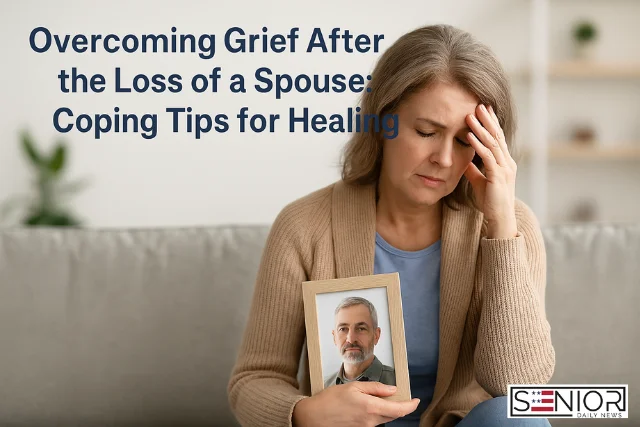Overcoming Grief After the Loss of a Spouse: Coping Tips for Healing

Losing a spouse is one of life’s most profound heartbreaks. Whether the loss was sudden or expected, the absence can feel like a deep emptiness that reshapes your world. You’ve lost not just a partner, but a confidant, best friend, and someone who shared your life’s journey. In moments like this, overcoming grief may feel impossible—but healing, while slow, is possible. It’s not about “moving on” but rather learning to live with the loss while finding ways to honor your spouse’s memory and still embrace life.
This guide will offer compassionate, practical coping tips for healing, backed by emotional understanding and expert insights.
Understanding the Nature of Grief
Grief is not a one-size-fits-all experience. It’s deeply personal, and it evolves over time. Psychologists often refer to the “five stages of grief”—denial, anger, bargaining, depression, and acceptance—but these stages aren’t linear. You may experience them in different orders, revisit some multiple times, or skip others entirely.
After losing a spouse, grief is not just emotional—it’s physical, mental, and even spiritual. Sleep disruptions, fatigue, loss of appetite, or feeling disconnected from the world are all common. Understanding that grief is a process, not a deadline, is the first step toward overcoming grief in a healthy way.
Give Yourself Permission to Feel
Many people try to hide or suppress their emotions after loss, thinking they must “stay strong” for others. But grief demands acknowledgment. Cry when you need to. Talk about your spouse. Journal your feelings. Emotions that are buried often resurface later in unhealthy ways.
You may experience:
- Guilt (“I wish I had said more”)
- Anger (“Why did this happen?”)
- Loneliness (“I feel invisible without them”)
These feelings are not signs of weakness—they are normal responses to a life-altering change.
Surround Yourself With Support
After the loss of a spouse, it’s tempting to isolate yourself, especially when others can’t fully understand your pain. However, human connection is essential for healing.
Consider:
- Friends and Family: Lean on those who are willing to simply listen without judgment.
- Support Groups: Widows’ and widowers’ groups provide understanding that only those in similar situations can offer.
- Therapy: A grief counselor can help you navigate the emotional waves and give you tools for overcoming grief.
If you’re not ready to talk about your loss, start with companionship in low-pressure environments—like attending a community class, walking with a neighbor, or volunteering.
Maintain Your Physical Health
Grief can drain you physically, leaving you vulnerable to illness and exhaustion. Taking care of your body will help your mind cope better.
- Eat nourishing meals even if your appetite is low.
- Get adequate sleep, even if you need to adjust your bedtime routine.
- Incorporate gentle movement like walking, yoga, or stretching to release stress and tension.
Self-care is not selfish—it’s a vital part of overcoming grief.
Keep a Connection With Your Spouse’s Memory
One of the fears people have after loss is that they’ll “forget” their loved one. Finding ways to honor their memory can provide comfort and meaning.
- Create a memory box with photos, letters, or keepsakes.
- Cook their favorite meal on special occasions.
- Plant a tree or flowers in their memory.
- Write letters to them when you feel the need to share your thoughts.
Remember, keeping their memory alive is not holding yourself back—it’s integrating their love into your ongoing life.
Set Small, Manageable Goals
After losing a spouse, even simple tasks can feel overwhelming. Setting small daily or weekly goals can help restore a sense of purpose.
- Tidy one room instead of cleaning the whole house.
- Commit to one social activity each week.
- Try a new hobby, even if it’s just for a few minutes a day.
These manageable steps can help you slowly rebuild your confidence and independence while still allowing space for grief.
Accept That Healing Is Not Linear
Some days will feel lighter; others will hit you with waves of sadness out of nowhere. This is part of the healing process.
Triggers like anniversaries, songs, or certain scents can bring grief flooding back. When this happens, allow yourself to feel the emotions without self-criticism. Remember—overcoming grief isn’t about never feeling sad again, but about learning to live fully despite the sadness.
Consider the Role of Faith or Spirituality
For many, faith provides comfort after loss. Prayer, meditation, or attending spiritual services can offer peace and a sense of connection. Even if you’re not religious, exploring mindfulness practices or nature’s beauty can nurture your spirit.
When to Seek Professional Help
While grief is natural, it can sometimes lead to prolonged depression or anxiety. You may benefit from professional help if:
- You feel hopeless or numb for months without improvement.
- You have thoughts of self-harm or suicide.
- You turn to alcohol or drugs to cope.
- You’re unable to perform daily tasks.
A therapist, psychiatrist, or grief counselor can help you navigate the difficult emotions and prevent prolonged mental health struggles.
Helping Yourself While Helping Others
Sometimes, helping others can aid in your healing process. Volunteering, mentoring, or offering support to others experiencing loss can provide a sense of purpose. It allows you to channel your own pain into empathy, making your spouse’s memory part of something positive.
The Importance of Patience
Perhaps the hardest part of overcoming grief is accepting that it takes time—often much longer than you (or others) expect. Well-meaning people may encourage you to “move on,” but only you can decide when you’re ready for new chapters in your life.
Be patient with yourself. Healing isn’t about erasing the love you shared—it’s about carrying it forward in a way that allows you to still find joy in living.
Coping on Special Days and Anniversaries
Special dates like birthdays, anniversaries, and holidays can reopen wounds. Plan ahead for these days:
- Spend time with supportive friends or family.
- Visit a place that was special to you both.
- Allow yourself to skip traditions if they feel too painful this year.
By acknowledging the difficulty of these days rather than avoiding them, you can prepare emotionally and protect your well-being.
Rebuilding Your Identity
When you’ve spent years as part of a couple, it can be challenging to see yourself as an individual again. Rediscovering who you are outside of your marriage can feel daunting but also empowering.
- Revisit hobbies or interests you set aside.
- Take a class to learn something new.
- Travel somewhere you’ve always wanted to go.
The goal isn’t to “replace” your spouse, but to embrace the parts of yourself that still deserve to thrive.
FAQs About Overcoming Grief After the Loss of a Spouse
1. How long does it take to heal after losing a spouse?
There’s no set timeline. Some people feel more stable after several months; for others, it takes years. Healing is highly personal.
2. Is it normal to still feel intense sadness after a year?
Yes. Anniversaries and reminders can reignite grief even after time has passed. This doesn’t mean you’re not healing—it’s a normal part of the process.
3. Should I avoid talking about my spouse to reduce my pain?
No. Talking about them can be an important part of healing. Suppressing memories can prolong grief.
4. How can I help a friend who lost their spouse?
Offer to listen, help with daily tasks, and remember important dates. Avoid clichés like “they’re in a better place.”
5. When should I seek professional help for grief?
If your grief feels unmanageable, prevents you from functioning, or leads to thoughts of self-harm, seek professional support immediately.
Image Source: Canva






